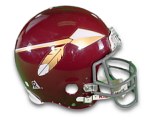Extremely Awkward Conversation With a Native American at Redskins Game
By Dolph L. Hatfield
Waya continued, “People are constantly telling me that the ‘R’ word means honor, but they have no idea how it really feels to an American Indian who associates the term with its history of being derogatory. Indeed, its history is deeply rooted in hatred; it’s even defined in the dictionary as a racial slur to American Indians.” Waya paused then continued. Waya proceeded. “Don’t you think that the affected party is the one who really decides what is racist and what isn’t?” Joe interrupted and, in a more consoling tone, said “Waya, I’d like to hear more of what you are talking about. The crowd is beginning to come in. Let’s slip out where there is less noise and I want to hear more. But PLEASE WIPE THAT CHARCOAL OFF YOUR FACE!” Waya took a towel from his coat and began to wipe his face. Joe, to the amazement of everyone sitting around him, removed his headdress. The two gentlemen began walking towards an exit, while Waya continued wiping the blackness from his face.
The two gentlemen found a quiet place somewhat away from the incoming crowd. Joe said “Go on Waya, you’ve got the floor and this better be good for me to miss part of my game.”
Waya continued “Joe, what you guys experienced is what we are going through now. If I’m not mistaken, in the early civil rights movement, the major emphasis of Black America was confronting many hardships like voting, education and unemployment inequalities, having to ride at the back of buses, separate eating, restroom and theater facilities, that were common place in the South. When the 1964 Civil Rights Act began taking affect and the unconscionable ways of treating African Americans were changing, your leaders turned their attention to addressing issues, such as stereotyping. Just think of the names and caricatures like the ‘N’ word, ‘boy’, ‘spade’, ‘jig’, ‘Sambo’, ‘Aunt Jemima’, ‘Jim Crow’, ‘Sapphire’ and ‘the Mammy’, and public spectacles, such as, painted black faces and black faced minstrel shows that your people said were demeaning. Many whites claimed that this was the way of life in America and it had been that way for years, many said they were only having some good, clean fun, meant no harm and there was no racism intended. But fortunately for blacks, much of white society realized the injustices of how Black America had been treated and they accepted that these acts that you,“ Waya pointed gently at Joe and continued “the affected party, said were stereotyping, and change occurred.” The two men looked at each other and Joe rubbed his head. “Waya, I have to agree with a lot you have said, please go on.”
“Thanks, Joe!” and Waya continued, “These changes did not come overnight and typecasting of blacks had been a way of life in America for many, many years. To my knowledge, there were no polls taken to see what percentage of blacks, or for that matter, other Americans, were opposed to these uses of derogatory words or stereotyping in general. But, Joe, there were many polls that have been conducted to see how many American Indians or Washington team fans think the ‘R’ word is racist.”
Waya realized that Joe was beginning to see his point and proceeded “I have often wondered if a poll had been taken among blacks, primarily living in the Deep South in the mid to late 1960’s, whether they cared that much about typecasting or the many other issues that Black America was facing. Recall that virtually all of the blacks in the South depended on whites for their jobs and livelihood. I would guess that the vast majority would have said these issues are not that important--wouldn’t they more likely have said that our jobs and livelihood depend on whites and we have to survive!”


No comments:
Post a Comment